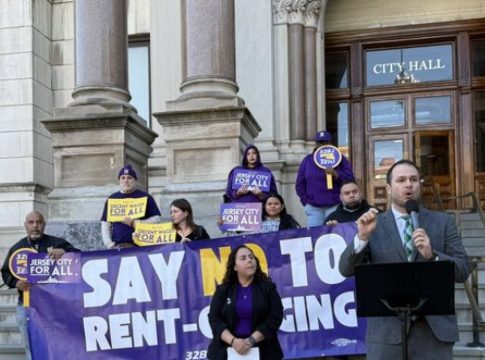Jersey City Takes a Stand Against Algorithm-Driven Rent Hikes
The city of Jersey City, New Jersey, has made headlines by becoming the latest locale to enact a ban on using algorithmic pricing in rental agreements, a practice that has stirred controversy and legal battles across the United States. This decision comes amid growing concerns over the implications of data-driven real estate strategies that often lead to steep rent increases.
Understanding the Algorithmic Pricing Model
At the heart of this issue is a service known as RealPage, which employs algorithms to gauge rental prices based on non-public data from various properties, including vacancy rates and unit sizes. While this model aims to assist landlords in maximizing profits, it has had the unintended effect of artificially inflating rents—sometimes by as much as 30 or 40 percent. Tenants across Jersey City, like Kevin Weller of Portside Towers, have felt the sting of such hikes firsthand.
Weller and his neighbors learned that the pricing decisions affecting their homes were not entirely in the hands of their landlords but dictated by an algorithm that assessed the competitive landscape. This has prompted lawsuits aimed at challenging the legality of using such pricing models, with tenants claiming it violates antitrust laws and encroaches on fair housing practices.
Growing Legislative Backlash
Legal action against RealPage has escalated, drawing attention from state attorneys general and the U.S. Department of Justice. The government is pursuing allegations of antitrust violations, arguing that such practices effectively allow landlords to collude on pricing by sharing sensitive rental data. This pressure has resulted in swift legislative responses. Cities like San Francisco, Philadelphia, and Minneapolis have already imposed similar bans, with jersey City following suit, reflecting a broader trend of municipalities taking action against potentially exploitative pricing strategies.
The Larger Context: A Patchwork of Regulations
While local bans are proliferating, the issue remains contentious at the state level. Notably, Colorado’s recent attempt to pass a ban was vetoed by Governor Jared Polis, who expressed concerns that the existing antitrust laws are sufficient for regulating such practices. Meanwhile, New York is weighing its options, with some legislators pushing for a comprehensive statewide measure.
Even as these discussions unfold, complicated dynamics persist at the national level. Proposed congressional measures aim to preempt state regulations around AI services, a potential move that could further entrench the very practices cities like Jersey City are trying to eliminate.
What’s Next for Tenants and Landlords?
Amidst this labyrinth of legal challenges and legislative outcomes, advocacy continues from tenants like Weller, who are striving for fair treatment in the housing market. By forming tenant associations and pursuing lawsuits, they are enhancing collective bargaining power against what they perceive as systemic exploitation.
As this situation evolves, it highlights a critical juncture in the intersection of artificial intelligence and tenant rights. The debate raises essential questions about fairness and transparency in housing: How much control should software algorithms have over our living costs? And at what point do technological advancements compromise basic economic fairness?
In conclusion, as Jersey City takes a bold step against algorithm-driven rent hikes, it signals a larger movement toward increasing scrutiny of AI applications in our daily lives—especially those that significantly impact housing and economic stability. The unfolding narrative emphasizes the need for balance between innovation and equitable business practices—a challenge that will be pivotal in shaping the future landscape of urban living and real estate.

Writes about personal finance, side hustles, gadgets, and tech innovation.
Bio: Priya specializes in making complex financial and tech topics easy to digest, with experience in fintech and consumer reviews.

